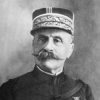Ferdinand Foch

Ferdinand Foch
Marshal Ferdinand Jean Marie Fochwas a French general and Marshal of France, Great Britain and Poland, a military theorist and the Supreme Allied Commander during the final year of the First World War. Historians describe two sides of Foch. The first is the aggressive, even reckless commander at the First Marne, Flanders, and Artois campaigns of 1914-1916. The other side is the Allied Commander-in-Chief who in 1918 successfully coordinated the French, British, American, and Italian efforts into a coherent whole...
NationalityFrench
ProfessionSoldier
Date of Birth2 October 1851
CountryFrance
The power to command has never meant the power to remain mysterious.
It takes 15,000 casualties to train a major general.
The unknown is the governing principle of war.
The laurels of victory are at the point of the enemy bayonets. They must be plucked there ; they must be carried by a hand-to-hand fight if one really means to conquer.
The distribution of troops devoted to the defence of a place includes a garrison, an occupying force, numerically as weak as possible; a reserve as strong as possible, designed for counterattacking and for providing itself, at the moment it goes into action, with a security service which will guard it from any possible surprise.
To be disciplined does not mean being silent, abstaining, or doing only what one thinks one may undertake without risk; it is not the art of eluding responsibility ; it means acting in compliance with orders received, and therefore finding in one's own mind, by effort and reflection, the possibility to carry out such orders. It also means finding in one's own will the energy to face the risks involved in execution.
In war there are none but particular cases; everything has there an individual nature; nothing ever repeats itself. In the first place, the data of a military problem are but seldom certain; they are never final . Everything is in a constant state of change and reshaping.
This absence of similarity among military questions naturally brings out the inability of memory to solve them; also the sterility of invariable forms, such as figures, geometrical drawings ( épures ), plans ( schémas ), etc. One only right solution imposes itself:;: namely, the application, varying according to circumstances, of fixed principles.
The truth is, no study is possible on the battle-field; one does there simply what one can in order to apply what one knows . Therefore, in order to do even a little, one has already to know a great deal and to know it well.
Every manoeuvre must be the development of a scheme; it must aim at a goal.
Far from being a sum of distinct and partial results, victory is the consequence of efforts, some of which are victorious while others appear to be fruitless, which nevertheless all aim at a common goal, all drive at a common result: namely, at a decision, a conclusion which alone can provide victory.
One is defeated only when one accepts defeat.
A battle won is a battle which we will not acknowledge to be lost.
The military mind always imagines that the next war will be on the same lines as the last. That has never been the case and never will be. One of the great factors on the next war will be aircraft obviously. The potentialities of aircraft attack on a large scale are almost incalculable.